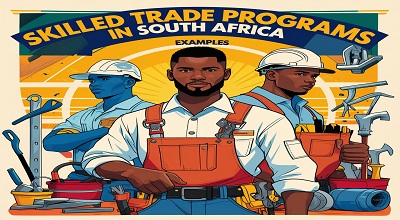Skilled Trade Programs in South Africa
Skilled Trade Programs in South Africa: South Africa faces a significant skills shortage in various technical and vocational fields. The Skilled trade programs play a crucial role in addressing unemployment by equipping individuals with hands-on, marketable skills. These programs provide training in fields such as electrical work, plumbing, welding, automotive repair, and construction.
What Are Skilled Trade Programs?
Skilled trade programs are vocational training courses designed to teach practical skills required for specific trades. Unlike traditional academic degrees, these programs focus on hands-on training, apprenticeships, and industry certifications.
Examples include:
- Electrician training
- Plumbing certifications
- Welding diplomas
- Automotive mechanic courses
These programs often lead to formal qualifications recognized by industries and employers.
Importance of Skilled Trade Programs in South Africa
South Africa has a high unemployment rate, particularly among youth. Skilled trade programs help by:
- Providing employable skills
- Reducing reliance on foreign skilled labor
- Supporting economic growth through infrastructure development
- Offering entrepreneurship opportunities
The government and private sector actively promote these programs to bridge the skills gap.
Types of Skilled Trade Program in South Africa
Electrical Trade Programs
These programs train individuals in electrical installations, maintenance, and repairs.
Example Institutions:
- Eskom Training Centers
- Northlink College (Electrical Engineering)
Plumbing Trade Programs
Plumbing courses cover pipefitting, sanitation systems, and water supply management.
Example Institutions:
- Plumbing Industry Registration Board (PIRB)
- False Bay TVET College
Welding Trade Programs
Welding programs teach metal fabrication, arc welding, and gas welding techniques.
Example Institutions:
- ArcelorMittal Welding Training School
- South African Institute of Welding (SAIW)
Automotive Repair Trade Programs
These courses focus on vehicle mechanics, diagnostics, and maintenance.
Example Institutions:
- Mercedes-Benz South Africa Academy
- Toyota Technical Training Institute
Carpentry and Joinery Trade Programs
Training includes woodworking, furniture making, and construction carpentry.
Example Institutions:
- Boland College
- The Furniture Technology Centre (FTC)
Bricklaying and Masonry Trade Programs
These programs teach bricklaying, plastering, and construction techniques.
Example Institutions:
- Construction Education and Training Authority (CETA)
- Gauteng City College
Government and Private Sector Initiatives Supporting Skilled Trades
- National Skills Development Strategy (NSDS) – Promotes vocational training.
- SETAs (Sector Education and Training Authorities) – Fund and regulate trade programs.
- National Student Financial Aid Scheme (NSFAS) – Provides financial support for TVET students.
Private companies like Siemens and BMW also offer apprenticeship programs.
Top Institutions Offering Skilled Trade Programs in South Africa
TVET Colleges
- False Bay TVET College
- Sedibeng TVET College
- Tshwane South TVET College
SETAs
- MERSETA (Manufacturing, Engineering, and Related SETA)
- CETA (Construction SETA)
Private Training Providers
- Boston City Campus (Technical Courses)
- Damelin (Vocational Programs)
How to Enroll in a Skilled Trade Program in South Africa?
- Choose a trade (e.g., plumbing, welding).
- Find an accredited institution (TVET college or private provider).
- Check entry requirements (Grade 9-12, depending on the program).
- Apply for funding (NSFAS, SETA bursaries).
- Complete the program and obtain certification.
Funding and Financial Aid for Skilled Trade Programs
- NSFAS – Covers tuition for TVET students.
- SETA Bursaries – Industry-specific funding.
- Learnerships – Paid apprenticeships.
Career Opportunities After Completing a Skilled Trade Program
- Electrician – Average salary: R180,000 per year.
- Plumber – High demand in construction.
- Welder – Opportunities in manufacturing and mining.
- Automotive Technician – Jobs at dealerships and repair shops.
Challenges Facing Skilled Trade Programs in South Africa
- Lack of awareness about vocational careers.
- Inadequate training facilities in some regions.
- Employer reluctance to hire inexperienced graduates.
Success Stories of Skilled Trade Graduates
- John Mabena – Started his own plumbing business after completing a PIRB course.
- Lerato Ndlovu – Became a certified electrician through Eskom’s training program.
Future of Skilled Trade Program in South Africa
With increasing infrastructure projects, skilled trades will remain in demand. The government plans to expand TVET colleges and improve apprenticeship opportunities.
Conclusion
Skilled trade programs in South Africa provide essential training for high-demand jobs. By enrolling in these programs, individuals can secure stable careers and contribute to the economy.
FAQs
1. What are the entry requirements for skilled trade programs?
Most programs require Grade 9-12, depending on the level of certification.
2. Are skilled trade programs recognized by employers?
Yes, SETA-accredited programs are widely recognized.
3. Can I get a job abroad with a South African trade qualification?
Yes, especially in countries with skills shortages (e.g., Australia, Canada).
4. How long do skilled trade programs take to complete?
Between 6 months (short courses) and 3 years (apprenticeships).
5. What is the average salary for skilled trade professionals?
R150,000 – R300,000 per year, depending on experience and industry.
Free Link: Best Asphalt 8 APK Mod
